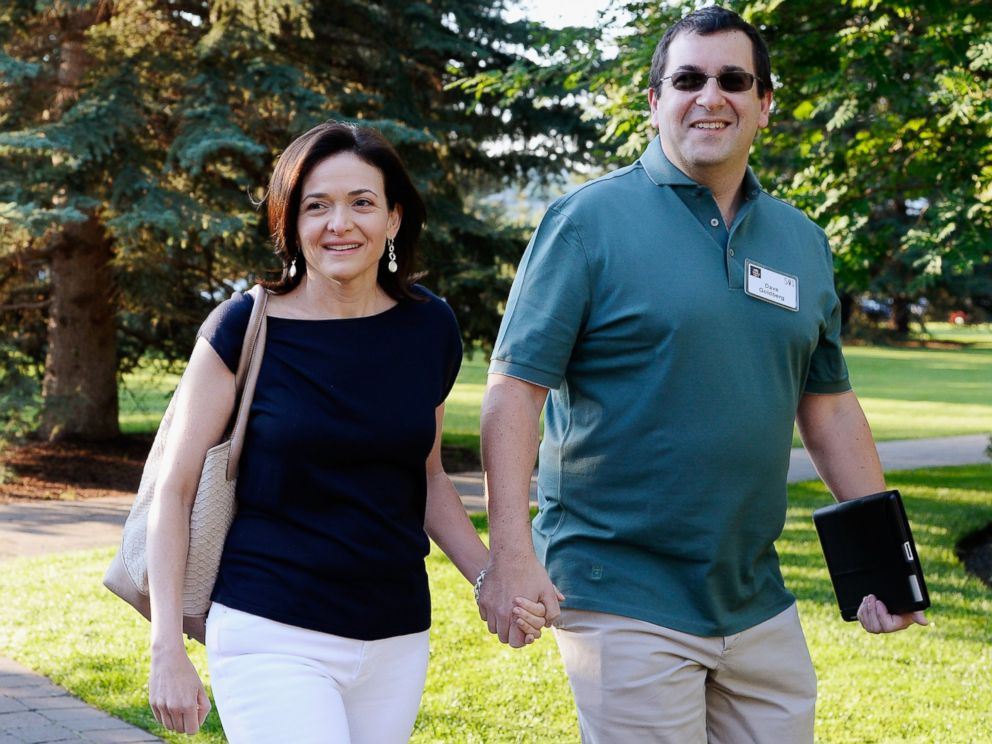3 takeaways from Facebook COO Sheryl Sandberg's new book on grief, 'Option B'
— -- Facebook chief operating officer Sheryl Sandberg was on vacation in Mexico in 2015 with her husband and friends when her husband, tech executive Dave Goldberg, passed away unexpectedly of a cardiac arrhythmia.
Sandberg, 47, was left as a single mother of her two children with Goldberg. She writes about recovering from the tragedy and working through the grief in her new book, “Option B: Facing Adversity, Building Resilience, and Finding Joy.”

The book -- which Sandberg co-wrote with her friend Adam Grant, a psychologist at the Wharton School of the University of Pennsylvania -- takes its name from a moment when Sandberg was grappling with not having Goldberg on hand to attend a father-child event with one of their children.
A friend, Sandberg writes in the book, told her, "Option A is not available. So let’s just kick the s--- out of option B.”
"We all live some form of option B," Sandberg told "Good Morning America" co-anchor Robin Roberts. "You've lived through cancer. People go to prison, people lose jobs, people get divorced, people suffer unbearable loss and the question is, then what? How do we make the most of it?"
Here are three takeaways from "Option B" on grief and recovering from tragedy.
1. What you should (and shouldn’t) say to someone who is grieving
Sandberg writes that after Goldberg's death she discovered she was "sometimes the friend who avoided painful conversations" because she worried about upsetting the person who was hurt.
"Losing Dave taught me how ludicrous that was," Sandberg wrote, adding that she often "felt invisible" herself after Goldberg's death and was "shocked" by friends who did not ask how she was doing.
“The elephant is always there. By ignoring it, those who are grieving isolate themselves and those who could offer comfort create distance instead," Sandberg wrote. "Both sides need to reach out. Speaking with empathy and honesty is a good place to start. You can’t make the elephant go away. But you can say, ‘I see it. I see you’re suffering. And I care about you.'"
Sandberg also said she eventually found the courage to explain that it was more helpful if people asked her the more specific question of how she was feeling today, in the moment.
"I did what proved so difficult to do with friends and colleagues face to face: I described how a casual greeting like ”How are you?” hurt because it didn’t acknowledge that anything out of the ordinary had happened," she wrote. "I pointed out that if people instead asked, “How are you today?” it showed that they were aware that I was struggling to get through each day."
2. Empathy is nice but encouragement is better
Sandberg draws upon her own experience of returning to work at Facebook to explain how she actually lost self-confidence when colleagues stepped in to pick up the slack for her.
"As people saw me stumble at work, some of them tried to help by reducing pressure. When I messed up or was unable to contribute, they waved it off, saying, 'How could you keep anything straight with all you’re going through?,'" she wrote. "In the past, I had said similar things to colleagues who were struggling, but when people said it to me, I discovered that this expression of sympathy actually diminished my self-confidence even more. What helped was hearing, 'Really, I thought you made a good point in that meeting and helped us make a better decision.' Bless you. Empathy was nice, but encouragement was better."
3. Encourage resilience by avoiding the three P's
Sandberg highlights the work of psychologist Martin Seligman who identified three P's that can stunt someone’s recovery.
Personalization: The belief that we are at fault.
Pervasiveness: The belief that an event will affect all areas of our life.
Permanence: The belief that the aftershocks of the event will last forever.
"The hardest of the 3 P’s for me to process was permanence," Sandberg wrote about her own grief. "For months, no matter what I did, I felt like the crushing anguish would always be there … When we’re suffering, we tend to project it out indefinitely … People also overestimated the negative impact of other stressful events.”
Speaking of the resilience that can emerge from moving past the three P's, Sandberg said it is what allows you to "breathe again."
"Resilience comes from deep within us and from support outside us. It comes from gratitude for what’s good in our lives and from leaning into the suck," she wrote. "It comes from analyzing how we process grief and from simply accepting that grief ... And in those moments that we’re able to summon our resilience, we realize that when life pulls you under, you can kick against the bottom, break the surface, and breathe again.”
Sheryl Sandberg is a member of the board for Disney, the parent company of ABC News.




